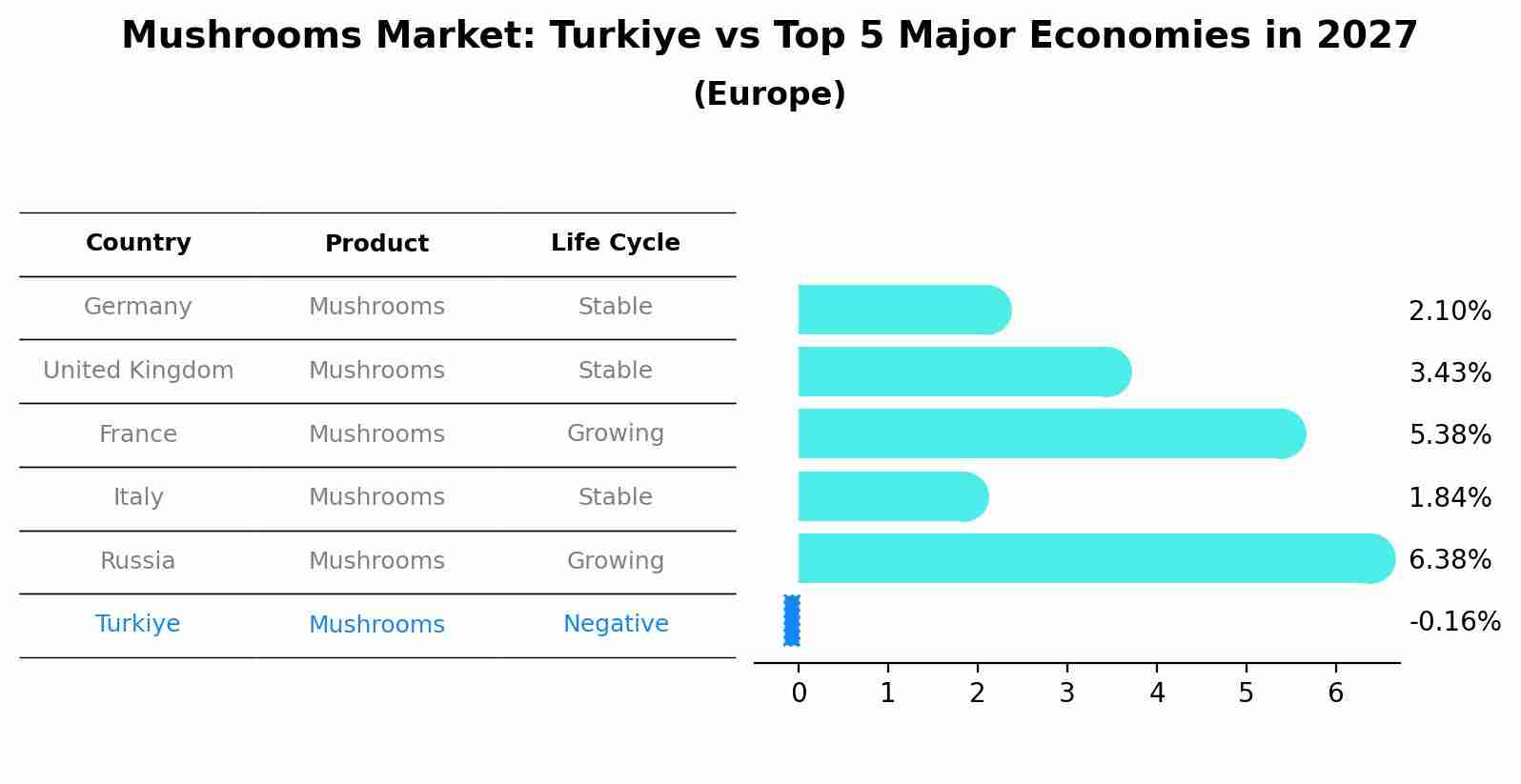Turkey Mushrooms Market (2025-2031) Outlook | Size, Share, Forecast, Trends, Revenue, Value, Companies, Industry, Growth, Analysis
| Product Code: ETC383198 | Publication Date: Aug 2022 | Updated Date: Jul 2025 | Product Type: Market Research Report | |
| Publisher: 6Wresearch | Author: Shubham Deep | No. of Pages: 75 | No. of Figures: 35 | No. of Tables: 20 |
Turkiye Mushrooms Market Size Growth Rate
The Turkiye Mushrooms Market is projected to witness mixed growth rate patterns during 2025 to 2029. The growth rate starts at -0.16% in 2025 and reaches -0.13% by 2029.

Mushrooms Market: Turkiye vs Top 5 Major Economies in 2027 (Europe)
In the Europe region, the Mushrooms market in Turkiye is projected to expand at a negative growth rate of -0.16% by 2027. The largest economy is Germany, followed by United Kingdom, France, Italy and Russia.

Turkey Mushrooms Market Synopsis
The Turkey mushrooms market is experiencing growth driven by increasing consumer awareness of the health benefits associated with mushrooms, such as being low in calories and high in nutrients. The market is characterized by a variety of mushroom types being cultivated, including button mushrooms, oyster mushrooms, and shiitake mushrooms. Key players in the market are focusing on product innovation, sustainable farming practices, and expanding distribution channels to meet the growing demand. Additionally, the rise of plant-based diets and the culinary versatility of mushrooms have contributed to the market`s expansion. However, challenges such as seasonality, perishability, and competition from imported mushrooms remain. Overall, the Turkey mushrooms market is poised for continued growth as consumers seek healthy and sustainable food options.
Turkey Mushrooms Market Trends
The Turkey mushrooms market is experiencing significant growth, driven by increasing consumer awareness of the health benefits associated with mushrooms. There is a rising demand for exotic and specialty mushrooms such as shiitake, oyster, and enoki varieties due to their unique flavors and nutritional profiles. Moreover, the growing popularity of plant-based diets and the rising trend of incorporating mushrooms into various dishes are further fueling market growth. Consumers are also showing a preference for organic and locally sourced mushrooms, leading to an increase in sustainable farming practices within the industry. The market is witnessing innovation in packaging and product diversification to cater to changing consumer preferences, indicating a promising future for the Turkey mushrooms market.
Turkey Mushrooms Market Challenges
The Turkey mushrooms market faces several challenges, including inconsistent supply due to factors such as weather conditions affecting cultivation, transportation issues, and limited technology adoption among growers. Quality control and storage facilities are often insufficient, leading to post-harvest losses. Additionally, competition from imported mushrooms and other vegetables poses a threat to local producers. Market fragmentation and lack of standardized grading systems also make it difficult for consumers to differentiate between various mushroom products. Furthermore, fluctuations in consumer preferences and dietary trends impact demand for mushrooms, creating uncertainty for market players. Overall, addressing these challenges requires improved infrastructure, technology investment, and market education to enhance the competitiveness and sustainability of the Turkey mushrooms market.
Turkey Mushrooms Market Investment Opportunities
Investment opportunities in the Turkey Mushrooms Market include the growing demand for exotic and specialty mushrooms such as shiitake, oyster, and lion`s mane due to their unique flavors and health benefits. Additionally, the increasing awareness of plant-based diets and the rise in vegetarian and vegan lifestyles are driving the demand for mushrooms as a meat substitute. Investing in innovative cultivation techniques, sustainable farming practices, and value-added products like mushroom powders, extracts, and supplements could be lucrative in tapping into this market. Furthermore, exploring export opportunities to cater to the global demand for Turkish mushrooms can also be a profitable investment strategy. Overall, the Turkey Mushrooms Market presents promising prospects for investors looking to capitalize on the health-conscious consumer trend and the growing popularity of exotic mushroom varieties.
Jordan Agar Market Government Policies
The government policies related to the Turkey Mushrooms Market primarily focus on promoting sustainable agriculture practices, ensuring food safety and quality standards, and supporting small-scale farmers in the production and marketing of mushrooms. The Turkish government provides subsidies and financial assistance to mushroom farmers, offers training programs to improve cultivation techniques, and enforces regulations to maintain product quality and safety. Additionally, there are initiatives to encourage research and development in the mushroom industry to enhance productivity and competitiveness. Overall, the government policies aim to boost the growth of the Turkey Mushrooms Market while safeguarding consumer health and promoting environmental sustainability in the sector.
Turkey Mushrooms Market Future Outlook
The Turkey mushrooms market is poised for steady growth in the coming years, driven by increasing consumer awareness about the health benefits of mushrooms, particularly their immune-boosting properties and nutritional value. Additionally, the rising trend of plant-based diets and growing interest in exotic cuisines are expected to further fuel the demand for mushrooms in Turkey. With advancements in cultivation techniques and sustainable farming practices, the market is likely to witness an expansion in product offerings and improved quality standards. The foodservice industry is also anticipated to play a significant role in driving market growth, as restaurants and cafes increasingly incorporate mushrooms into their menus. Overall, the Turkey mushrooms market presents promising opportunities for industry players to innovate and capitalize on the growing consumer preferences for healthy and sustainable food choices.
Key Highlights of the Report:
- Turkey Mushrooms Market Outlook
- Market Size of Turkey Mushrooms Market, 2024
- Forecast of Turkey Mushrooms Market, 2031
- Historical Data and Forecast of Turkey Mushrooms Revenues & Volume for the Period 2021 - 2031
- Turkey Mushrooms Market Trend Evolution
- Turkey Mushrooms Market Drivers and Challenges
- Turkey Mushrooms Price Trends
- Turkey Mushrooms Porter's Five Forces
- Turkey Mushrooms Industry Life Cycle
- Historical Data and Forecast of Turkey Mushrooms Market Revenues & Volume By Product for the Period 2021 - 2031
- Historical Data and Forecast of Turkey Mushrooms Market Revenues & Volume By Button for the Period 2021 - 2031
- Historical Data and Forecast of Turkey Mushrooms Market Revenues & Volume By Shiitake for the Period 2021 - 2031
- Historical Data and Forecast of Turkey Mushrooms Market Revenues & Volume By Oyster for the Period 2021 - 2031
- Historical Data and Forecast of Turkey Mushrooms Market Revenues & Volume By Matsutake for the Period 2021 - 2031
- Historical Data and Forecast of Turkey Mushrooms Market Revenues & Volume By Truffles for the Period 2021 - 2031
- Historical Data and Forecast of Turkey Mushrooms Market Revenues & Volume By Other for the Period 2021 - 2031
- Historical Data and Forecast of Turkey Mushrooms Market Revenues & Volume By Form for the Period 2021 - 2031
- Historical Data and Forecast of Turkey Mushrooms Market Revenues & Volume By Fresh for the Period 2021 - 2031
- Historical Data and Forecast of Turkey Mushrooms Market Revenues & Volume By Processed for the Period 2021 - 2031
- Historical Data and Forecast of Turkey Mushrooms Market Revenues & Volume By Distribution Channel for the Period 2021 - 2031
- Historical Data and Forecast of Turkey Mushrooms Market Revenues & Volume By Direct to Customer for the Period 2021 - 2031
- Historical Data and Forecast of Turkey Mushrooms Market Revenues & Volume By Grocery Stores for the Period 2021 - 2031
- Historical Data and Forecast of Turkey Mushrooms Market Revenues & Volume By Supermarkets & Hypermarkets for the Period 2021 - 2031
- Historical Data and Forecast of Turkey Mushrooms Market Revenues & Volume By Convenience Stores for the Period 2021 - 2031
- Historical Data and Forecast of Turkey Mushrooms Market Revenues & Volume By Online Stores for the Period 2021 - 2031
- Historical Data and Forecast of Turkey Mushrooms Market Revenues & Volume By Application for the Period 2021 - 2031
- Historical Data and Forecast of Turkey Mushrooms Market Revenues & Volume By Food for the Period 2021 - 2031
- Historical Data and Forecast of Turkey Mushrooms Market Revenues & Volume By Pharmaceutical for the Period 2021 - 2031
- Historical Data and Forecast of Turkey Mushrooms Market Revenues & Volume By Cosmetics for the Period 2021 - 2031
- Turkey Mushrooms Import Export Trade Statistics
- Market Opportunity Assessment By Product
- Market Opportunity Assessment By Form
- Market Opportunity Assessment By Distribution Channel
- Market Opportunity Assessment By Application
- Turkey Mushrooms Top Companies Market Share
- Turkey Mushrooms Competitive Benchmarking By Technical and Operational Parameters
- Turkey Mushrooms Company Profiles
- Turkey Mushrooms Key Strategic Recommendations
Frequently Asked Questions About the Market Study (FAQs):
- Single User License$ 1,995
- Department License$ 2,400
- Site License$ 3,120
- Global License$ 3,795
Search
Thought Leadership and Analyst Meet
Our Clients
Related Reports
- Afghanistan Rocking Chairs And Adirondack Chairs Market (2026-2032) | Size & Revenue, Competitive Landscape, Share, Segmentation, Industry, Value, Outlook, Analysis, Trends, Growth, Forecast, Companies
- Afghanistan Apparel Market (2026-2032) | Growth, Outlook, Industry, Segmentation, Forecast, Size, Companies, Trends, Value, Share, Analysis & Revenue
- Canada Oil and Gas Market (2026-2032) | Share, Segmentation, Value, Industry, Trends, Forecast, Analysis, Size & Revenue, Growth, Competitive Landscape, Outlook, Companies
- Germany Breakfast Food Market (2026-2032) | Industry, Share, Growth, Size, Companies, Value, Analysis, Revenue, Trends, Forecast & Outlook
- Australia Briquette Market (2025-2031) | Growth, Size, Revenue, Forecast, Analysis, Trends, Value, Share, Industry & Companies
- Vietnam System Integrator Market (2025-2031) | Size, Companies, Analysis, Industry, Value, Forecast, Growth, Trends, Revenue & Share
- ASEAN and Thailand Brain Health Supplements Market (2025-2031) | Strategy, Consumer Insights, Analysis, Investment Trends, Opportunities, Growth, Size, Share, Industry, Revenue, Segments, Value, Segmentation, Supply, Forecast, Restraints, Outlook, Competition, Drivers, Trends, Demand, Pricing Analysis, Competitive, Strategic Insights, Companies, Challenges
- ASEAN Bearings Market (2025-2031) | Strategy, Consumer Insights, Analysis, Investment Trends, Opportunities, Growth, Size, Share, Industry, Revenue, Segments, Value, Segmentation, Supply, Forecast, Restraints, Outlook, Competition, Drivers, Trends, Demand, Pricing Analysis, Competitive, Strategic Insights, Companies, Challenges
- Europe Flooring Market (2025-2031) | Outlook, Share, Industry, Trends, Forecast, Companies, Revenue, Size, Analysis, Growth & Value
- Saudi Arabia Manlift Market (2025-2031) | Outlook, Size, Growth, Trends, Companies, Industry, Revenue, Value, Share, Forecast & Analysis
Industry Events and Analyst Meet
Whitepaper
- Middle East & Africa Commercial Security Market Click here to view more.
- Middle East & Africa Fire Safety Systems & Equipment Market Click here to view more.
- GCC Drone Market Click here to view more.
- Middle East Lighting Fixture Market Click here to view more.
- GCC Physical & Perimeter Security Market Click here to view more.
6WResearch In News
- Doha a strategic location for EV manufacturing hub: IPA Qatar
- Demand for luxury TVs surging in the GCC, says Samsung
- Empowering Growth: The Thriving Journey of Bangladesh’s Cable Industry
- Demand for luxury TVs surging in the GCC, says Samsung
- Video call with a traditional healer? Once unthinkable, it’s now common in South Africa
- Intelligent Buildings To Smooth GCC’s Path To Net Zero


















